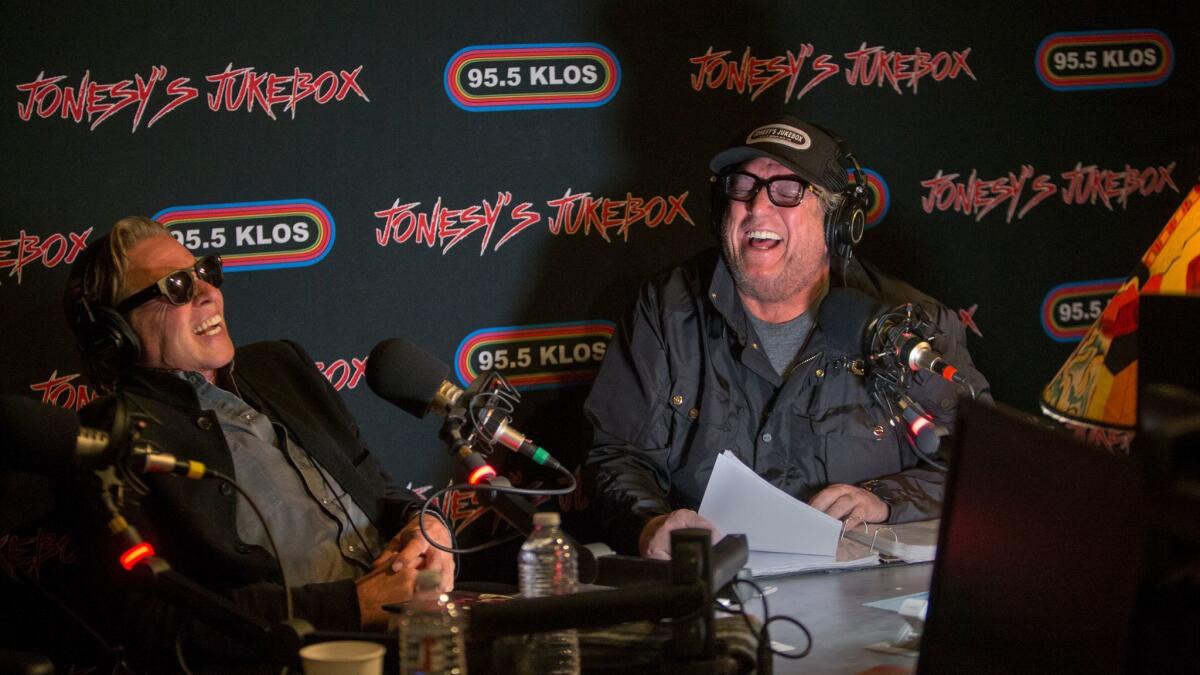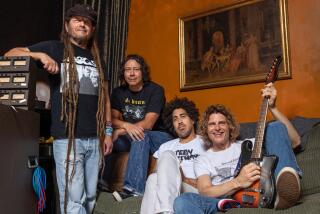Steve Jones is and will always be punker than you. And he has a memoir.

Sitting in the captain’s chair in the studio at radio station KLOS is Steve Jones. The host of “Jonesy’s Jukebox” chats off air with his guest Val Kilmer while “Vicious,” by Lou Reed, broadcasts on 95.5 FM. The producer and the board operator keep time on how close they are to the end of the song, and other staff members hand the producer notes of business and ticket giveaways that need to be covered. Jones and Kilmer are in animated conversation when they’re interrupted by the producer and told that they go live in 10 seconds. The board operator hands Jones a paper, and everyone in the studio goes quiet.
Jones slows his vocal pace and all his attention is directed at the microphone. After getting the radio audience up to speed about the playlist and his guest, he jumps back into animated conversation with Kilmer — this time on air.
“Jonesy’s Jukebox” has been a staple of Los Angeles radio since 2004, when it started on Indie 103. Even though it has moved stations and had a couple of gaps off air, the show still plugs along, and for Steve Jones it’s about the music.
It’s been about the music since he was a boy in West London in the 1960s. There, Jones writes, he found escape from living a life of poverty and even from his stepfather’s molesting him. As a teenager he started a band with Paul Cook that became theSex Pistols, the punk rock band that changed the face of music in the 1970s.
Malcolm was drawn to me, he probably saw I was damaged goods and he kind of liked people like that.
— Steve Jones
Though his bandmate John Lydon (a.k.a. Johnny Rotten) has already published two books telling his story, Jones, the Sex Pistols’ guitar player, waited until now. In “Lonely Boy,” published in January by Da Capo, Jones recounts the rise and fall of the Sex Pistols, his other bands, his sobriety and personal revelations, all beginning with his troubled youth.
In the book, Jones writes, “It would be a pretty twisted kind of God who would say ‘Let’s abuse that child so he can go off the rails and form a band.’ But … God, destiny, whatever you want to call it — definitely threw me a lifeline in giving me music to hang on to.”
And off the rails he went: acting out sexually as a chronic Peeping Tom and becoming a kleptomaniac.

“I always had to look for some kind of relief and that relief was from stealing, which gets you out of your head, it’s almost like a drug. There’s a name for it, kleptomania, because it really wasn’t about the stealing, half [of what] I stole I didn’t need it,” Jones says after he’s finished with his radio show with Kilmer.
Later he found another connection to music by stealing gear from his idols David Bowie and Brian Ferry. He didn’t feel that it was quite a crime, he writes — more like collecting trophies.
Jones found family when he started hanging out at Vivienne Westwood and Malcolm McLaren’s shop called Let It Rock, later changed to Sex.
“Malcolm was drawn to me, he probably saw I was damaged goods and he kind of liked people like that,” he says.
Some of this history is well-known: Jones and his pal Cook started jamming, Jones on guitar and Cook on bass. Glen Matlock worked at the shop part time and joined in on bass. As a trio, Jones was also the lead singer; McLaren got involved and auditioned singers, landing on Lydon.
I always had to look for some kind of relief.
— Steve Jones
The Sex Pistols recorded “Anarchy in the U.K.” and were about to go on tour and might have been just another band. But when Queen canceled a television appearance, their record label got them on a prime-time TV show hosted by Bill Grundy that broadcast live to London. In the green room before going on air, everyone was drinking, even Grundy.
“I’d never been on TV, I was terrified and the booze is always a good relaxer, but I might have had too much booze because I was very bold, but I let [Grundy] have it. He was flirting with Siouxsie from the Banshees, who came on as a fan at that point, and I just swore and it all went out live and changed everything…. As much as it was publicity you couldn’t buy in a trillion years, to me it was almost the beginning of the end,” Jones recalls.
The contentious, profanity-filled appearance made the ban notorious.
“That’s when we got rid of Glen and we started recording ‘Never Mind the Bollocks.’ Sid was in the band, couldn’t play. Thank God he had to go into the hospital when we were doing ‘Never Mind the Bollocks,’ he had jaundice or something so he was in the hospital and that allowed me to play bass,” Jones remembers the band’s problematic bass player Sid Vicious. “That’s how that went down and it weren’t long after that when Sid joined the band that it really fell apart and we did a few shows in London or wherever, and then we went to America. So it seemed like it was destined to implode.”
The Sex Pistols broke up after their last gig in San Francisco in 1978. Almost four decades later, both Lydon and Jones live in Los Angeles. But they live separate lives — the last time they spoke was in 2008, during the band’s reunion tour.
“It’s like a bad marriage, you get divorced you don’t wanna see the … wife. I only wish him the best, only the best, I wish him success…. He don’t want to talk to me, I don’t want to hang out with him.”
In “Lonely Boy,” Jones chronicles his personal demons — including addiction, recovery, and relationships — as well as the struggles with those involved with the Sex Pistols. It’s honest and vulnerable. He takes responsibility for his own actions and is gracious, something he attributes to 26 years of sobriety and his meditation practice.
Through all of the ups and downs, music is still an escape for Jones. Five days a week he’s at KLOS hosting “Jonesy’s Jukebox.” When the show’s over, Jones puts on his leather jacket and leaves the confines of the soundproof studio where he’ll be back at it again Monday. He says he plans to take a ride on his motorcycle during the weekend.
“Some days I don’t wanna be in it because I think I’m a rock star. It’s actually good for me … a structure, that’s good for my head because left to my own devices I would just stay at home, watch TV, watch porn, eat big cream pies....”
DuShane is the author of “Confessions of a Teenage Jesus Jerk.” He teaches novel writing at UCLA Extension.
More to Read
Sign up for our Book Club newsletter
Get the latest news, events and more from the Los Angeles Times Book Club, and help us get L.A. reading and talking.
You may occasionally receive promotional content from the Los Angeles Times.







